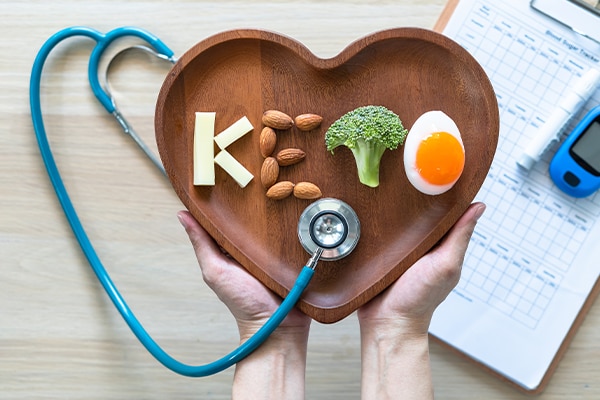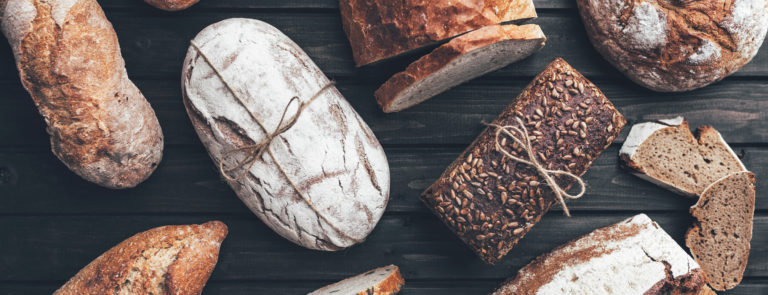10% off £35
What is ketosis?

Ketosis is a metabolic state where your body is primarily fuelled by fat, instead of sugar, and because of this, it has become a popular method for weight management.
In this guide, we will tell you everything you need to know about ketosis – from how to know you are in a ketogenic state, to the risks associated with following a keto diet.
Skip to: - What is ketosis? | How to get into ketosis | How can you tell if you’re in ketosis? | 5 common symptoms of ketosis | How long does it take to get into ketosis? | Side effects & dangers of ketosis | Ketosis vs. ketoacidosis | The final say
So, what is ketosis?
Ketosis is the name that’s used to describe when our metabolism is functioning in a certain way. It’s the moment when our bodies are mainly fuelled by fat, AKA ‘ketones’, and occurs when access to glucose (blood sugar) is limited.1 As a result, the body burns fat instead of its usual energy source, carbohydrates.2
How to get into ketosis
How to get into ketosis
Some people choose to follow a ‘keto diet’ as a method to lose weight, which involves putting your body into a state of ketosis. In terms of how you reach ketosis, people generally need to eat less than 50g of carbs a day. This can sometimes drop to 20 grams per day.3
For more guidance on what to eat to get into ketosis, check out our keto diet plan for beginners here.


How can you tell if you’re in ketosis?
There are several ways to determine if you are in ketosis, indicating that your body is utilizing fat for energy instead of carbohydrates. Here are some common methods:
- Ketone Urine Strips: These strips are available over-the-counter at chemists or online, and can detect the presence of ketones in your urine. However, some research suggests that they are not always sensitive enough to detect mild ketosis and therefore are not 100% accurate.4
- Breath Ketone Meters: These devices measure the level of acetone, a type of ketone, in your breath. They can give you an idea of your ketone production but are less precise than blood ketone meters.5
- Blood Ketone Meters: Considered the most accurate method, these devices measure the level of beta-hydroxybutyrate (BHB) ketones in your blood. A small prick on your finger allows you to obtain a blood sample for testing.6
- Ketosis Symptoms: Many people experience certain signs when they enter ketosis, including a change in body odour and a change in energy levels. Read more about the signs and symptoms of ketosis below.
5 common symptoms of ketosis
- Change in energy levels. It can take your body some time to get used to functioning on less carbs. During this time, it’s not unusual to suffer from fatigue as it readjusts. You should hopefully perk back up as your body gets more used to burning fat to keep itself going.
- Reduced appetite. Ketosis can lead to a reduction in appetite for a number of reasons, including increased satiety, stable blood sugar levels, reduced insulin levels, appetite suppression, and increased metabolic efficiency.7,8,9,10 Listening to your body's hunger and fullness cues is crucial, and it's essential to prioritize balanced nutrition and adequate calorie intake for overall well-being.
- Change in odour. Ketosis can affect various bodily odours, including your urine, your sweat, and your breath. Often described as a fruity scent, this smell is caused by your body creating by-products (ketones) as it breaks down fat into energy.11 One of these by-products includes acetone, which is the same acetone found in nail varnish remover.
- Dehydration. Low carbs can lead to electrolyte and mineral imbalances. Being deficient in potassium, sodium, and magnesium, can cause unpleasant cramping anywhere on your body.12 Another tell-tale sign of dehydration and common symptom of ketosis is a dry mouth.13
- Constipation. An unfortunate symptom of ketosis is trouble going to the bathroom. This is down to the fact that you are eating significantly less carbohydrates that happen to also contain fibre (the stuff that keeps you regular). What’s more, carbs are usually converted by your body into glycogen. Glycogen which has a high water content, which also helps keep your system lubricated.
How long does it take to get into ketosis?
Ketosis is a process and it doesn’t just happen overnight. It can take up to 12 weeks for the transition to fully take place. Generally speaking, within:
- The first few days – the process starts within your body
- A week to 10 days – you may crave sugary foods and carbs, you may feel fatigued or experience headaches.14
- Two to three weeks - the body has usually accomplished most of its work in adapting to using fat for energy. 14 By this point, hunger and food cravings fade and stamina and vitality increase
- The coming weeks and months – the body continues to make more subtle changes, such as craving less protein


Side effects & dangers of ketosis
Ketosis is a journey that can come with some side effects. The degree to which these side effects are felt can vary from person to person, which is why it is so important to speak to your doctor or healthcare professional before starting the keto diet, to see if this is a suitable option for you.
- Low libido – Although research into this area is limited and the results are conflicting, there is some evidence that suggests ketosis can have a negative impact on your sex drive.15
- The Keto Flu – caused by the body initially entering a low-carb state, which can bring about symptoms, such as headaches, weakness, irritability, nausea and vomiting.16
- Bad body odour 11
- Body cramps
- Kidney and heart damage - low electrolytes and fluid combined with increased urination can lead to lower sodium, magnesium, and potassium levels. And this can potentially make the body susceptible to acute kidney injury.17
Ketosis vs. ketoacidosis
Not to be confused with ketosis, diabetic ketoacidosis (DKA) is a serious and potentially life-threatening complication of diabetes.
DKA occurs when there isn't enough insulin in the body, therefore it begins to break down fat as fuel instead.18 As a result, ketones start to build up in the bloodstream. If this process goes untreated, they can build up to dangerous levels in the body, requiring immediate medical attention.19
DKA usually affects people with type 1 diabetes, but it can also develop in people with type 2 diabetes who need insulin.20
The final say
The final say
- Ketosis is a metabolic state where the body primarily utilizes fat to create energy instead of carbohydrates.
- Achieving ketosis is the goal for those following a keto diet for weight management
- Various methods can be used to determine if you are in ketosis, such as urine strips, breath ketone meters, blood ketone meters, or simply looking out for common symptoms such as changes in energy levels, body odour, dehydration, and constipation.
- The transition into ketosis can take up to 12 weeks, with different stages of adaptation.
- Negative side effects of ketosis can include low libido, keto flu, bad body odour, and body cramps
- It's important to listen to your body and consult with a healthcare professional before starting a ketogenic diet.


- https://www.ncbi.nlm.nih.gov/books/NBK499830/
- https://www.ncbi.nlm.nih.gov/pmc/articles/PMC6472268/
- https://www.ncbi.nlm.nih.gov/pmc/articles/PMC7556427/
- https://www.ncbi.nlm.nih.gov/pmc/articles/PMC7520093/
- https://jissn.biomedcentral.com/articles/10.1186/s12970-020-00404-2
- https://pubmed.ncbi.nlm.nih.gov/31126118/
- https://www.ncbi.nlm.nih.gov/pmc/articles/PMC6566854/
- https://pubmed.ncbi.nlm.nih.gov/25402637/ https://pubmed.ncbi.nlm.nih.gov/34358822/
- https://www.ncbi.nlm.nih.gov/books/NBK493179/
- https://www.ncbi.nlm.nih.gov/pmc/articles/PMC1150229/
- https://www.menshealth.com/nutrition/a26234592/keto-dry-mouth/
- https://www.verywellhealth.com/what-is-keto-adaptation-2241629
- https://www.sciencedirect.com/science/article/pii/S2665902619300056
- https://pubmed.ncbi.nlm.nih.gov/1249190/
- https://www.ncbi.nlm.nih.gov/pmc/articles/PMC7082414/
- https://pubmed.ncbi.nlm.nih.gov/34336911/
- https://www.cdc.gov/diabetes/basics/diabetic-
- ketoacidosis.html https://www.nhs.uk/conditions/diabetic-ketoacidosis/
- https://www.diabetes.org.uk/guide-to-diabetes/complications/diabetic_ketoacidosis














